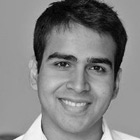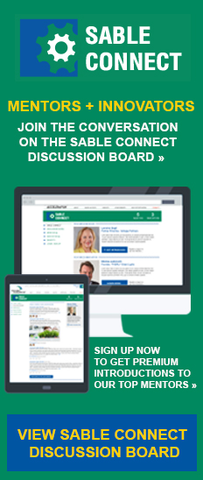expert views« Back to Expert Views Listings

Faheem Kajee
Co-Founder, Found (Previously Pashash)
Found (formerly Pashash) is an app that allows users to share their real-world shopping experiences and thoughts relating to deals and reviews on a real-time basis. When users see a great buy, they simply snap a picture, tag the shop and price, and share it with their peers. Found also allows people to discover the best buys that others are posting at stores around them based on their unique interests. Think of it as Pinterest meets Foursquare—but focused solely on shopping.
The business operates based on three key facts: real-world shopping still accounts for 93 percent of all shopping in the U.S.; people are sharing more and more real-world content through their mobile phones; and more than 70 percent of smartphone users use their phones to help them while shopping (Google, 2012). While Found is focused on user acquisition in the short term, it offers key opportunities for brands and shops to take advantage of powerful social recommendations because—according to Nielsen—92 percent of people trust the recommendations of their friends when making purchasing decisions.
Key avenues for commercial integration are available through highly qualified, relevant and intent-based advertising, loyalty rewards and white-labeling of the platform. Pashash is backed by Google Umbono and is set to compete at the finals of TNW Startup World in Silicon Valley in early 2013. It is currently available in the iPhone App Store and will soon be available for Android.
David Kitley spent some time with Faheem to understand more about Found and how it evolved from Pashash, as well as his skills, background, passion and some of the cultural differentiators between Silicon Valley and South Africa. Read on for more.
David Kitley: Why did you change the company name to Found from Pashash?
Faheem Kajee: The name Pashash is South African slang for something cool. Although we've always been targeting international markets, we thought it would be nice to have a little authentic South African flavor.
The problem with the name Pashash is that it didn't translate well internationally. It left people wondering what the app was about. With Found and Found Shopping, we honed down on the emotion that someone feels when they have found a great deal at a store.
What markets do you have your eyes on?
Because Found is so powerful in the local context, we are trying to expand country by country, starting off with South Africa. Thereafter, we hope to move on to the U.S. and Singapore because of their large markets and high smartphone penetration.
The app is integrated with the Google Places API to automatically detect your location and currency. All the content is also generated by users, so if people pick up the app anywhere in the world and start using it, a community can grow organically.
How do you envision strategic partners can work with you?
Right now, we're looking for strategic partners who can help distribute the app and raise market awareness internationally.
For the partner, Found provides the unparalleled ability to harness and amplify the social recommendations of their customers. This is particularly relevant given the fact that according to Nielsen research, 90 percent of people trust the recommendations of friends.
Your core skills and background seem to be more finance and marketing based. How did you adapt these to forming and developing Found? How important were the skills you obtained in previous jobs?
I think the core skill that I have carried through from my previous jobs into my experience at Found has been my knowledge of the tech industry.
When I worked at the SIM Global Best Ideas Feeder Fund, I analyzed and visited tech and media companies around the world. I then moved to the World of Avatar, where I focused on analyzing and advising startup tech businesses focused on the opportunities in Africa. It was most enlightening for me to get the opportunity to work on putting the Mxit deal together. Mxit is Africa's largest social network, and the acquisition was one of the largest in the domestic consumer tech context.
What were the first skills that you recruited? Considering the startup phase you were in, what did you look for in terms of employees?
The first person I hired was Lawrence Webley, my co-founder, to manage the technical development of our business. He is great because he is passionate about smartphone development and has a keen understanding of the user experience on mobile phones. It was very important for me to ensure that the user experience on Found is simple and intuitive.
What advice do you have for fellow startups who don’t have the skills and the capital they need?
Entrepreneurs that don't have the necessary skills should think about learning new skills themselves. There are many resources online that facilitate this, and at least some knowledge of all aspects of the business is required to manage the team adequately.
Entrepreneurs should also not be hesitant to raise equity for fear that they will be losing control of their company. Investors can help grow the business—not just with their money, but with their advice and access to their networks, too.
You spent two months in Silicon Valley. How important was this experience? What were your key learnings?
From a product standpoint, mentors in Silicon Valley taught me the need to focus clearly on one single value proposition. This singular focus was missing from the original Pashash app and helped us focus clearly on building a refined experience in Found.
From a personal perspective, the experience helped me hone in on what is really important to me: building big, audacious businesses and create a reality that does not exist. Found is one such business.
What do you feel is missing from the South African culture that you wish you could mirror following your Silicon Valley experience?
I think the quality of talent in South Africa is as good as anywhere in the world. Young South African entrepreneurs still need to work on their confidence to target building large global businesses.
Looking back, how would you have done it better or differently?
There's so much I'd do differently in retrospect, and there are many mistakes that I can only see in hindsight. I've learned a lot through the process, though. My biggest regret is not starting Pashash/Found earlier.
Your LinkedIn profile advertises you as a lover of crazy ideas and says that you’re inspired by making a big impact. At what stage did you feel like you had stumbled upon a crazy idea? What/who motivated you to leave World of Avatar to pursue it?
The idea for Found is actually quite an old one. It was hatched by a friend and myself back in late 2007, but we never had the chance to really get it going. I have always wanted to be an entrepreneur, and working at the World of Avatar was such an inspiring experience that I felt the time had come to finally take the leap.
I think we live in a unique time when the barriers to creating large, global businesses are as low as they've ever been, and the industry is not mature enough yet that it is impossible to compete.
How do you manage major ideas? Do you have a trick or habit?
I think the biggest lesson I've learned is to focus as much as possible on the ideas one is passionate about executing. The trick would be to not get distracted with every new idea that comes by.
What impact do you hope to make?
I would like to build a product that people absolutely love using.
For more information about the Found app, visit http://www.foundshopping.com/.
About Faheem Kajee
Faheem Kajee is the CEO of Found. He previously worked for an award-winning global equity fund focusing primarily on the technology, media, and education spaces around the world. Apart from Found, his next major experience was whilst working at the World of Avatar where he worked on the acquisition of Mxit (Africa's largest social network).
Lawrence Webley joined Found as CTO after finishing at the top of his computer science class. He is passionate about smartphone development and has served brief stints at Tasty Poison Games (Dragooo), Korbitec (Property 24), and Indaba.
Both Kajee and Webley are graduates of the University of Cape Town.
« Back to Expert Views Listings
Other Expert Views:
Q&A with Donovan Neale-May, Founder, SABLE Accelerator, CMO Council
Q&A with Kathryn Sharfman, CMO and Chief Platform Officer, Sun Exchange
Q&A with Bernard Wolfsdorf , Founder & Managing Partner, Wolfsdorf Immigration Law Group
Q&A with Pieter van Schalkwyk, CEO, XMPro
Q&A with Steuart Pennington, CEO , South Africa - The Good News
Q&A with Pumela Salela, SABLE Advisory Board Member, Global Sourcing Council
Q&A with Prof. (JD) Jonathan Jansen, Vice-Chancellor and Rector, UFS UV
Q&A with Pieter de Villiers, Founder and CEO, Clickatell
Q&A with Anthony Stonefield, Managing Director, Gramercy Millennium Group
Q&A with Pumela Salela, SABLE Advisory Board Member, Global Sourcing Council
To Become a Superstar, Improve Your Strengths (Not Your Faults), Auren Hoffman, CEO, LiveRamp
Q&A with Jake Davidow, Founder, Teach Me Sushi and Teach Me Chocolate
Q&A with Eran Eyal, Co-founder, Springleap
Q&A with Bradley Smith, Co-Founder, BusinessOptics
Q&A with Nick McCreath, Co-Founder, Super Simple Survey
Q&A with Barry Kayton, Founder and CEO, Cognician
Q&A with Michael Leeman, Entrepreneur and Investor, RunwaySale, Gyft and Miombo Consulting
Q&A with Anita Nel, CEO: Innovation and Business Development, InnovUS, Stellenbosch University
Q&A with Laurie Olivier, Partner - 4Di Capital, Board Member and Chairman, HealthQ Technologies
What You Know Now Beats Who You Know, Auren Hoffman, CEO, Rapleaf

